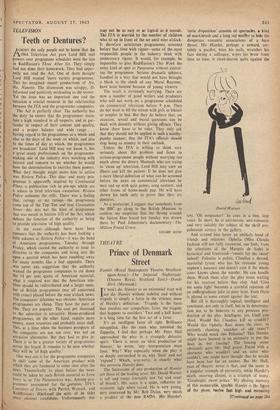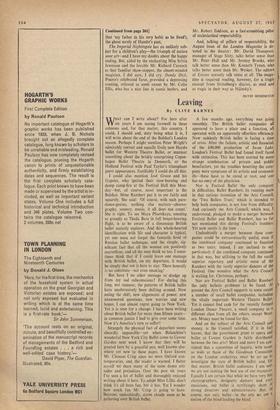THEAT RE
Prince of Denmark Street
Hamlet. (Royal Shakespeare Theatre, Stratford- upon-Avon.)--The Imperial Nightingale. (Theatre Royal, Stratford East.)—Dandy Dick. (Mermaid.) IT won't do. Heimlet as an existential tract will not do. Hamlet without nobility and without tragedy is simply a farce in the strictest sense of Huxley's definition: 'Tragedy is the farce that involves our sympathies; farce, the tragedy that happens to outsiders.' Two and a half hours is a long time for the first act of a farce.
It's an intelligent farce all right. Brilliance misapplied, like the man who invented the Zeppelin. I -feel that perhaps Mr. Peter Hall approached the play in a strangely defeatist spirit. 'There is never an ideal production of Hamlet.' he wrote, 'any interpretation must limit.' Why? Why especially when the play is so deeply entrenched in us, why 'limit' and not 'expand'? Which, arsy-versy, is exactly what this perverse Hamlet does. The limitations of any production of Hamlet are those of the leading actor. Mr. David Warner is tall and rangy (certainly not 'fat and scant of breath'). His voice is a quiet, reflective in- strument, ugly when raised. He is very young, very impressed by Mr. Bob Dylan, very much a product of the new RADA. His Hamlet's
'antic disposition' consists of spectacles, a kind of mackintosh and a long red muffler to hide the dangerous romantic associations of a bare throat. His Hamlet, perhaps a coward, cer- tainly a pacifist, bites his nails, scratches his face during a soliloquy, wipes his brow from time to time, is clean-shaven quite against the
David Warner text. 'Oh vengeance!' he cries in a tiny, tiny voice. In short, he is anti-heroic, anti-romantic and very suitably the subject of the shrill pre- pubescent ecstasy in the gallery.
And around him hover an unlikely band of friends and relations. Ophelia (Miss Glenda Jackson still not fully recovered, one feels, from the attentions of the Marquis de Sade) is hysterical and frustrated—'sweets for the sweet' indeed! Polonius is politic, Claudius a shrewd, masterful tyrant who has his tiresome young nephew's measure and doesn't care if the whole court knows about the murder. He can handle them. Watch them after the play scene waiting for his reaction before they clap. And 'Give me some light' becomes a scornful rejection of an untlergraduate joke in poor taste. Even Osric is played to some extent against the text.
But all is thoroughly topical, intelligent and consistent, not only in itself, but in its determina- tion not to be behoven to any previous pro- duction of the play. Intelligent, yes. Until you think. Would this Claudius kill so crudely? Would this Ophelia float down the river, so patiently chanting 'snatches of old tunes'? Who would mock this Polonius? This Hamlet might have learned in an extremity to put the boot in, but fencing? The fencing scene obviously gave Mr. Hall pause. Faced with a character who wouldn't and an actor who couldn't, one might have thought that he would have been lost for an answer. But Mr. Hall, man of theatre, never is that, and the scene is a singular triumph of perversity, while Hamlet's death, sneering almost, is a triumph of irony. 'Goodnight, sweet prince.' My abiding memory of this memorable, ignoble Hamlet is the figure of the ghost, twelve feet high and menacing
[Confirmed on page 264 Continued from page 2611 (but `my father in his very habit as he lived), the ghost surely of Hamlet's pasts The imperial Nightingale has an unlikely sub- ject for a children's play—the triumph of nature over art—and I have my doubts about the happy ending. But, aided by the enchanting Miss Sylvia Jewesson and the lovable Mr. Richard Curnock as that familiar show-stopper, the absent-minded magician. I did care, I did cry. Dandy Dick, Pinero's celebrated farce, provided a depressing evening, relieved to some extent by Mr. Colin Ellis, who has a nice line in comic butlers. and Mr. Robert Eddison, as a fast-crumbling pillar of ecclesiastical respectability.
And, talking of pillars of respectability, the August issue of the London Magazine is de- voted to the theatre: Mr. David Thompson, manager of Stage Sixty, talks better sense than Mr. Peter Hall and Mr. Jeremy Brooks, who talk better sense than Mr. Kenneth Tynan, who talks better sense than Mr. Wesker. The editors of Encore scarcely talk sense at all. The maga- zine is required reading, however, for a tragic excerpt from Strindberg's diaries, as mad and as tragic in their way as Nijinsky's.
DAVID BENEDICTUS































 Previous page
Previous page